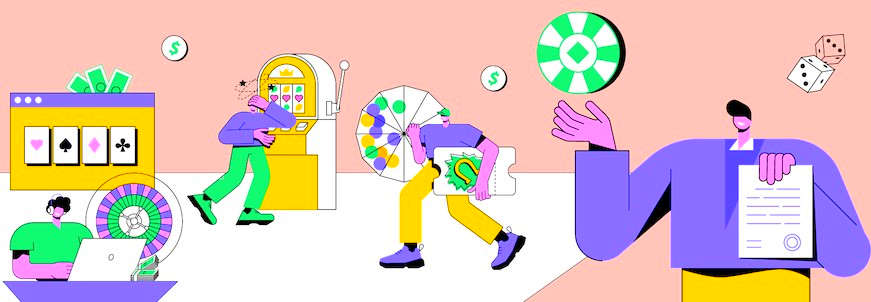Responsible Gambling
Online internet casinos are great fun, but remember that they might as well become your worst nightmare. Before playing at an online casino, it is very important to first understand the importance of responsible gambling.
What is responsible gambling?
Responsible gambling is a broad concept that encompasses several principles that apply to gambling to make sure casinos provide a safe gambling experience, and protect people from the potential negative consequences of gambling online.
Remember that gambling should only be considered as a form of entertainment, not a way to make money. While most of us have no problem treating casino games only as recreation, it can be much more difficult for some.
Both online gambling platforms and gaming providers are required to comply with responsible gambling rules. In addition, casino software providers must support online operators in meeting technical and legal requirements.
Below you will find 7 types of responsible gambling areas directly related to the online gambling industry:
- Prevention of underage gambling;
- Protection of vulnerable players;
- Ethical and responsible marketing;
- Privacy of information;
- Security measures against criminal activities;
- Protection of online payments;
- Secure online environment.
Do you have a potential gambling problem?
Problem gambling is something that many people encounter these days. You don’t even have time to turn around and your gambling can very quickly turn from harmless fun, to an unhealthy obsession that can lead to real problems. Whether you play slots, poker, scratch cards, or bet on sports, a gambling problem can spoil your personal relationships, cause problems at work, or lead to bankruptcy. Below are a series of important questions you should ask yourself if you think you have a gambling problem:
- Do you find it difficult to stop gambling after incurring a major loss?
- Does gambling cause financial problems for you or your family?
- Do you think you might have a gambling problem?
- Does gambling have a negative impact on your personal relationships, work or studies?
- Does gambling cause any health problems, including stress or anxiety?
- Do you become nervous when you are not gambling?
- Do you have to gamble larger amounts to get the same feeling of excitement?
- Do you feel guilty about the amount of money you spend on gambling?
Helping someone with a gambling addiction
Most people can enjoy gambling without it becoming a problem, but some people become addicted to gambling, which can have a negative impact on their lives. The desire to gamble can be overwhelming, leading people to steal, lie and spend all their savings. There are several signs that indicate when simple enjoyment of gambling turns into a problem. The earlier a gambling problem is detected, the better the chances of a successful cure. Although compulsive gambling is difficult to overcome, many people are able to cope with the disease with professional help, and support from family and friends.
Required age for gambling and protection of minors
The permitted age to legally gamble at a land-based, or online casino in Australia is 18. As far as land-based casinos are concerned, some may require that you be at least 21 or 23 years old to use the casino. As for online casinos, the required age will not vary and you must be at least 18 years old to legally play at an online casino.
Most online casino operators take every precaution to never promote advertisements that could attract people under the age of 18. Despite all the efforts imposed by gambling site operators, it is important to remember that it is easy for children to access the Internet, and only in cooperation with parents can minors be taught about the dangers of accessing illegal websites. To help you prevent your child from accessing such sites, we have prepared some important points you should consider:
- Always “log out” immediately after a gaming session ends;
- Don’t use autocomplete for login information;
- Keep your usernames and passwords out of the reach of children;
- Make sure your credit card information is secure and confidential;
- Don’t play on gambling sites in the presence of children;
- Don’t allow your children to spend all their free time online;
- Learn more about the tools available to parents on your devices;
- Inform your child about the dangers of accessing illegal sites, especially online gambling.
As we mentioned above, you can use various tools that can help you control your child’s online activity.
Tools to support responsible gambling
All gambling sites offer tools designed to help players control the amount of time and money they spend on casino games. Below we have detailed all the options available to players.
Deposit limit
If you feel you are losing control over the amount of money you deposit into your gambling account, you can always set a deposit limit. Decide how much money you can devote to gambling per day, per week, or per month. Then set a limit that will not exceed your budget. This way you can have more control over your gambling and avoid financial problems in the future.
Loss limit
A loss limit is practically the same as a deposit limit, but you specify the maximum amount of money you can lose, instead of putting a limit on your deposits. This is a great option for anyone who has trouble quitting the game after failing to win.
Let’s be honest, sometimes it’s very hard to accept losing money and players often try to recoup lost money, which is not a good idea. Imposing a limit on losses will give you time to cool down and return to the game the next day.
Session time limit
Another limit you can impose on your casino account is a session time limit. This limit is sure to come in handy for all players who feel they spend too much time at online casinos. Sometimes it is very easy to lose track of time while enjoying your favorite games, so it is very important to control the time you spend playing.
Time out
Time out is a feature available in online casinos that you can use if you want to keep playing, but for the moment you want to take a break for a while. This is a very good option if you feel that you have been spending too much time and money playing lately. During a break, you can block yourself from playing for a certain period of time.
Online casinos usually offer this feature for the following periods:
- 24 hours;
- one week;
- one month;
- any period the customer requests – up to a maximum of six weeks.
Betting limit
Another option offered by some online casinos is a betting limit. This means that you can impose a limit per round, or spin that cannot exceed a certain amount. For example, you can impose a betting limit of no more than PLN 20.
Self-exclusion
Self-exclusion means asking a gambling service provider to exclude you from gambling on their site for a specified period of time, usually six to twelve months, but for online gambling it can be up to five years.
Self-assessment
Self-assessment in gambling is known as the Problem Gambling Severity Index (PGSI). The PGSI is a reliable and standardized measure of risky gambling behavior. The self-assessment is based on research on the typical symptoms and consequences of problem gambling. Typically, the self-assessment test includes a series of questions about gambling.
Most people who have a hard time will answer YES to 6 or more of these questions. Here are some examples of self-assessment test questions:
- Have you ever borrowed money to finance your gambling?
- Have you ever lost time dedicated to work or study because of gambling?
- Has gambling ever made your home life unhappy?
- Has gambling affected your reputation?
- Have you ever felt remorse after gambling?
- Have you ever gambled to get money to pay off debts, or otherwise solve your financial problems?
- Has gambling caused a decrease in your ambition or productivity?
- After losing, did you feel that you had to come back as soon as possible and make up for your losses?
- After winning, did you have a strong urge to go back and win more?
- Did you often gamble until you lost your last penny?


